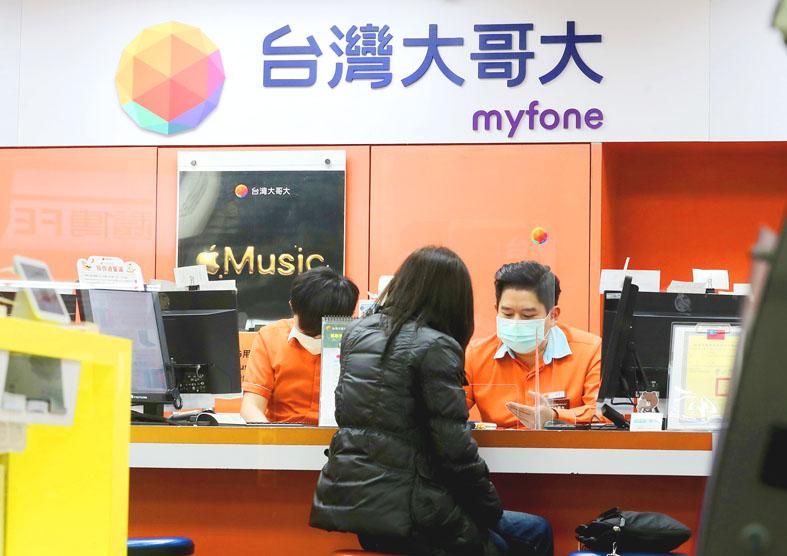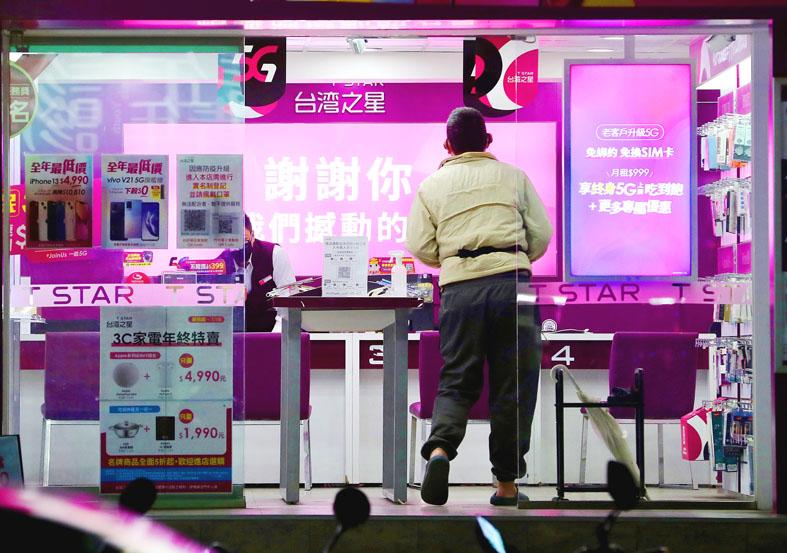Taiwan Mobile Co (台灣大哥大), the nation’s second-largest telecom, yesterday said it would acquire Taiwan Star Telecom Corp (台灣之星), the nation’s fourth-largest carrier, as the company aims to expand its customer base, and boost efficiency and competitiveness in the local market.
Taiwan Mobile aims to enlarge its spectrum of resources for greater economies of scale, the telecom said.
It also looks to achieve earnings and net-worth growth, as well as better customer satisfaction, the company said.

Photo: CNA
Taiwan Mobile, which had 7.11 million users as of the end of September, and Taiwan Star, which had 2.65 million users, would have a combined customer base of 9.76 million, the companies told a news conference in Taipei yesterday.
That would be higher than the 9.12 million users Far EasTone Telecommunications Co (遠傳電信) and Asia Pacific Telecom Co (亞太電信) have through a business partnership, the firms said.
Its combined customer base would come close to the 10.65 million users of Chunghwa Telecom Co (中華電信), the nation’s largest telecom, they said.

Photo: CNA
Taiwan Mobile said it is planning to issue 282.222 million new common shares that would be given to Taiwan Star shareholders in exchange for their shares.
The exchange ratio would be one Taiwan Star share for 0.04508 of its own shares, Taiwan Mobile said, adding that its calculations were based on Taiwan Star’s stock price as of June 30, expected merger synergies and comparable companies’ price-to-book ratios.
Taiwan Star would be dissolved after the merger, the companies said.
The deal is subject to approvals from a Taiwan Star shareholders’ meeting and regulatory authorities, they said.
The firms aim to complete the deal by Sept. 30 next year, but no later than Dec. 31, with the option of extensions if both parties agree, they said.
With the addition of Taiwan Star’s 5G licenses, Taiwan Mobile would own 100 megahertz of the 3.5 gigahertz frequency band, which would help speed up its promotion of 5G services to corporate clients, Taiwan Mobile president Jamie Lin (林之晨) said.
After the merger, Taiwan Mobile would terminate its 3G network and thousands of 4G base stations to avoid overlapping resources, which would help save significant amounts of energy, Lin said.
Taiwan Mobile would respect all contracts customers signed with Taiwan Star and hopes to gain support from regulators, he said.

MULTIFACETED: A task force has analyzed possible scenarios and created responses to assist domestic industries in dealing with US tariffs, the economics minister said The Executive Yuan is tomorrow to announce countermeasures to US President Donald Trump’s planned reciprocal tariffs, although the details of the plan would not be made public until Monday next week, Minister of Economic Affairs J.W. Kuo (郭智輝) said yesterday. The Cabinet established an economic and trade task force in November last year to deal with US trade and tariff related issues, Kuo told reporters outside the legislature in Taipei. The task force has been analyzing and evaluating all kinds of scenarios to identify suitable responses and determine how best to assist domestic industries in managing the effects of Trump’s tariffs, he

TIGHT-LIPPED: UMC said it had no merger plans at the moment, after Nikkei Asia reported that the firm and GlobalFoundries were considering restarting merger talks United Microelectronics Corp (UMC, 聯電), the world’s No. 4 contract chipmaker, yesterday launched a new US$5 billion 12-inch chip factory in Singapore as part of its latest effort to diversify its manufacturing footprint amid growing geopolitical risks. The new factory, adjacent to UMC’s existing Singapore fab in the Pasir Res Wafer Fab Park, is scheduled to enter volume production next year, utilizing mature 22-nanometer and 28-nanometer process technologies, UMC said in a statement. The company plans to invest US$5 billion during the first phase of the new fab, which would have an installed capacity of 30,000 12-inch wafers per month, it said. The

Taiwan’s official purchasing managers’ index (PMI) last month rose 0.2 percentage points to 54.2, in a second consecutive month of expansion, thanks to front-loading demand intended to avoid potential US tariff hikes, the Chung-Hua Institution for Economic Research (CIER, 中華經濟研究院) said yesterday. While short-term demand appeared robust, uncertainties rose due to US President Donald Trump’s unpredictable trade policy, CIER president Lien Hsien-ming (連賢明) told a news conference in Taipei. Taiwan’s economy this year would be characterized by high-level fluctuations and the volatility would be wilder than most expect, Lien said Demand for electronics, particularly semiconductors, continues to benefit from US technology giants’ effort

‘SWASTICAR’: Tesla CEO Elon Musk’s close association with Donald Trump has prompted opponents to brand him a ‘Nazi’ and resulted in a dramatic drop in sales Demonstrators descended on Tesla Inc dealerships across the US, and in Europe and Canada on Saturday to protest company chief Elon Musk, who has amassed extraordinary power as a top adviser to US President Donald Trump. Waving signs with messages such as “Musk is stealing our money” and “Reclaim our country,” the protests largely took place peacefully following fiery episodes of vandalism on Tesla vehicles, dealerships and other facilities in recent weeks that US officials have denounced as terrorism. Hundreds rallied on Saturday outside the Tesla dealership in Manhattan. Some blasted Musk, the world’s richest man, while others demanded the shuttering of his